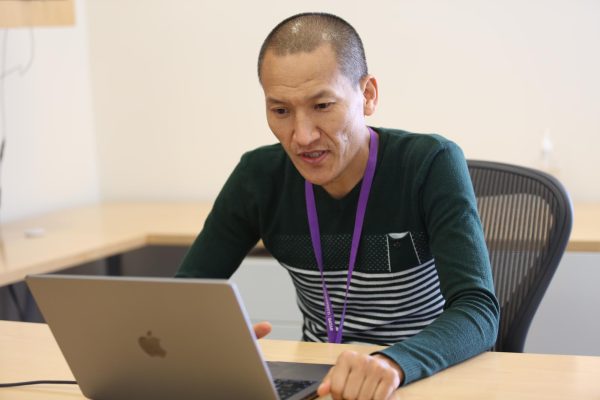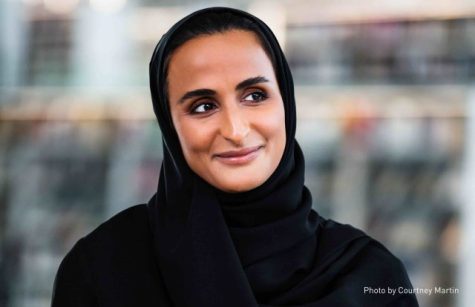NU-Q Professor Subject of Controversy After Receiving QNRF Grant
This article has been updated to better clarify Chaudary’s views.
Northwestern University in Qatar announced in a tweet on January 27 that Professors S. Venus Jin and Jocelyn Mitchell had been awarded a $700,000 Qatar National Research Fund grant to study women entrepreneurship in Qatar. The announcement was met with outrage online because Mitchell posted a racially insensitive email about Arab women to a blog in 2008 that she deleted in 2015.
Some, however, have argued this protest is a case of cancel culture and her apologies and work at NU-Q should be seen as a testament to her growth.
The upset netizens on Twitter also have complained because the grant was not awarded to Arab researchers, saying a Qatari woman should have been chosen to conduct the research.

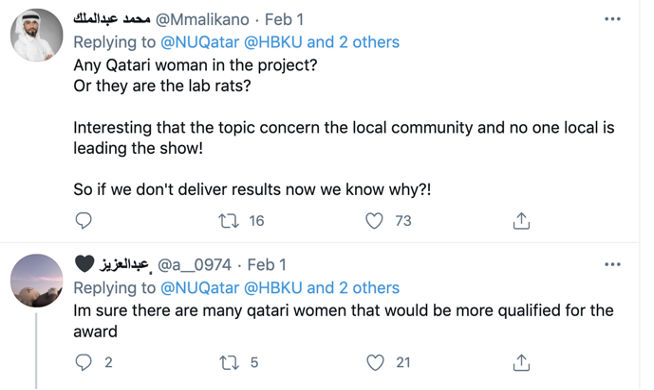
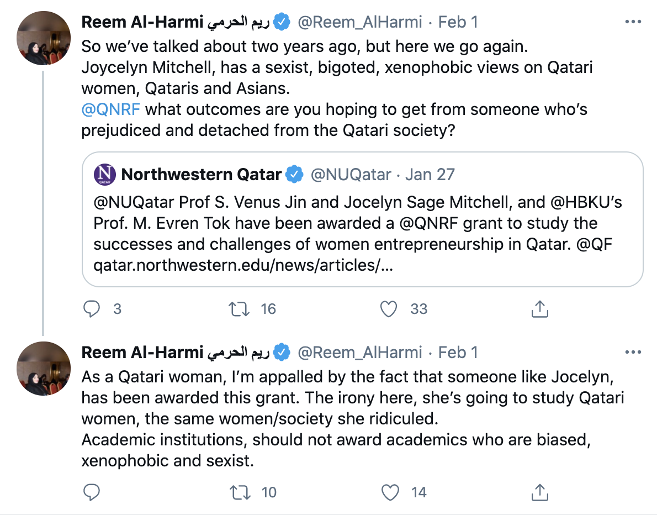
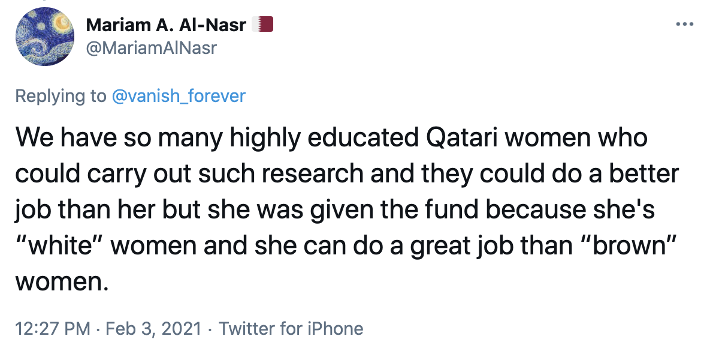
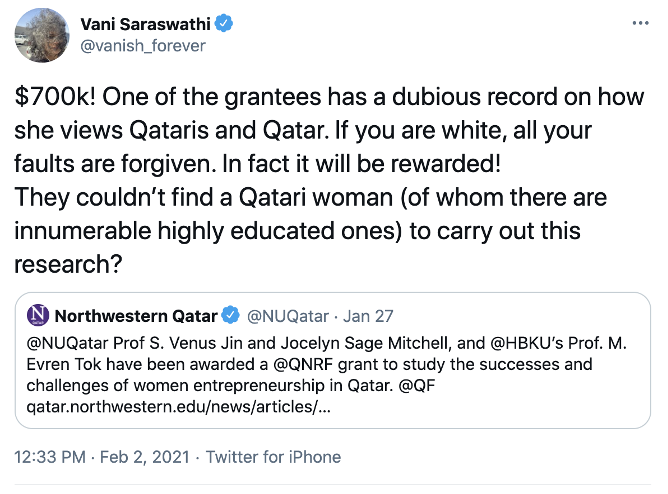
“At the very least a due diligence investigation should be done in order to assess the credibility and legitimacy of potential authors prior to obtaining funds,” Sharifa Ahen, an NU-Q alumna wrote in a tweet.
In response to the comments criticizing the grant, the QNRF issued a statement detailing the process they follow to evaluate the proposals they receive, stating in part:
“QNRF awards grants based on a rigorous, two-tier review process conducted by independent international peer-reviewers, and a panel comprising local experts and relevant stakeholders to evaluate proposals submitted by researchers in all fields of science across our various funding programs. Successful applications are awarded based on their merit, expected contribution to the field of knowledge, taking into account the academic qualifications of the researchers and the benefits and the alignment of the research topics to Qatar’s national priorities… We are encouraged by the comments calling for more grants to be given to Qatari researchers, whose participation in our funding programs we actively seek and welcome. We look forward to receiving their applications in both the current and upcoming cycles of our diverse portfolio of research-funding and capacity-building programs.”
In addition to Jin and Mitchell, researchers for the project will include Mohamed Evren Tok, a Turkish professor at Hamad Bin Khalifa University, and Egyptian consultants Ahmed Aref from the Doha International Family Institute and Eid Mohamed from the Doha Institute of Graduate Studies.
Protesters fear Western values held by the chosen researchers will misrepresent Arab women. “Western values towards culture, law, and even religion are omnipresent . . . I got an amazing education, but it was not without the constant confusion and framing of my own identity as something exotic,” Ahen said.
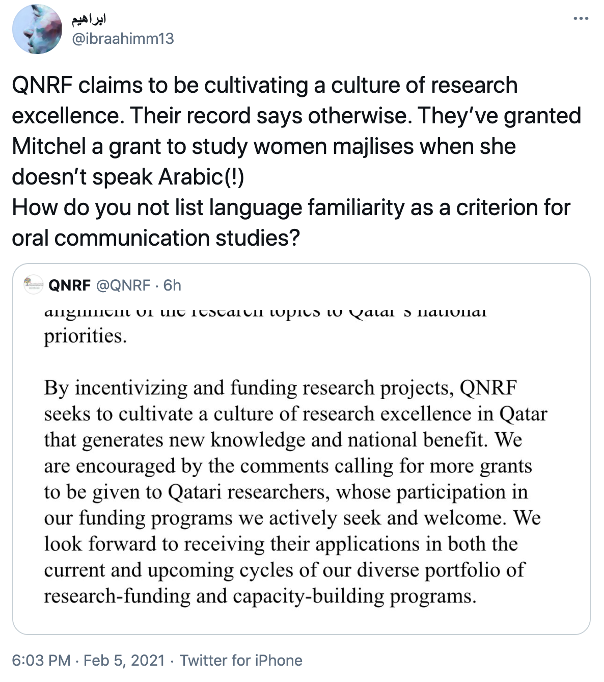


Protesters also complained about Mitchell’s previous participation in a published study of the conflicting pressures facing Qatari women entitled “In Majaalis al-hareem: the complex professional and personal choices of Qatari women.”
“I am particularly offended by a piece of work she has produced in her never-ending attempt to classify the female Arab person. This disgraceful attempt was called Majlisha. But now, forevermore, there is a piece of published work that is telling a flat out lie about my culture and its people,” Ahen said.
The Daily Q reached out to Ahen about how she formed her opinion on the majlisha study since she was not involved, but reporters did not receive a response.
In an email to the Daily Q regarding the study, Mitchell said, “The majlisha, or majlis al hareem, [is] a designated, intergenerational meeting space or salon, where women gather freely for various purposes, such as to discuss issues, in a formal or informal atmosphere. The majlis has been viewed—erroneously—as a male-only space. We wanted to highlight the fact that women, too, have a majlis space within the home, with important similarities to the male majlis, including: the frequency of meetings; the use of the space as a way of networking and information gathering and sharing; and the various reasons for meeting, which can extend beyond family gatherings to encompass religious topics, educational experiences, neighborhood issues, or socializing. And yet it is also important to highlight the differences that a women’s majlis has from the men’s, such as: the need for increased privacy; the emphasis on foods and drinks, service, and décor; and the specific topics discussed, which have particular relevance to women facing often conflicting pressures from state and society over their gendered roles and responsibilities.”
She noted that Qatari students were involved in conducting the research, and two nationally representative surveys were conducted through Qatar University’s SESRI, involving 1,049 Qatari women in 2014 and 608 Qatari men and women in 2015.
The controversial blog post in question has been resurfacing since it was deleted in 2015, and Mitchell has issued public apologies several times. Students at NU-Q also expressed anger about the post in 2019 during protests against former Dean and CEO Everette E. Dennis. At the time, Mitchell apologized during an NU-Q town hall and wrote to NU-Q professor Justin Martin, who tweeted on her behalf:
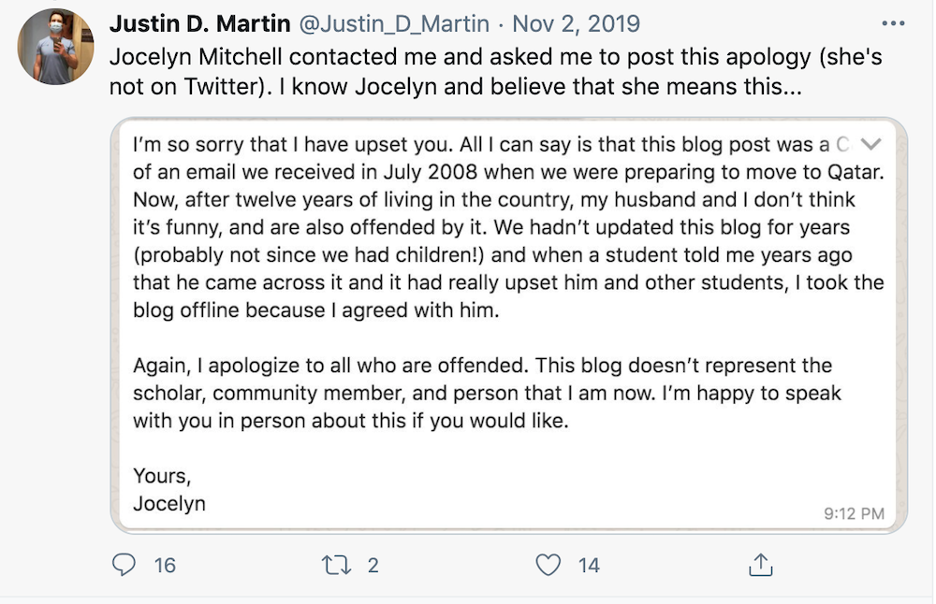
In response to the recent protests, Mitchell provided the following statement to the Daily Q:
“The screenshot circulating online is from a 2008 email I received while moving to Qatar. I entirely reject the words and sentiments of this 2008 email, and I apologize for posting it to my blog in the first place. It does not reflect how I feel about Qatar and its many communities, especially after 13 years living and working here. I apologized and deleted the blog in 2015 when students first brought it to my attention, and then publicly apologized to the entire NUQ community in 2019 when the screenshot resurfaced. I want to thank my colleagues, students, and friends who have helped me grow in this area,”
Jin provided the following statement:
“Our new research project on the challenges and opportunities of Qatari women entrepreneurship includes Arab colleagues from institutions such as the Doha Institute for Graduate Studies and DIFI, and we are partnering with DIFI, NAMA, the Qatar Business Women Association, and the Museum of Islamic Art. We look forward to working with these colleagues and organizations to highlight the experiences and concerns of Qatari women entrepreneurs and provide useful research findings that align with the goals of the Qatar National Vision and the Qatar National Development Strategy regarding human development and economic diversification.
“As our proposal states, our research project will hire and train both Qatari and international students to be full partners in the knowledge creation process, from design to dissemination. As the leading principal investigator (LPI), I encourage anyone who wants to get involved with this project to reach out to me so that I can include them and their insights in some way. As a recent newcomer to Qatar, I am approaching this research with humility and eagerness to learn, from my students, colleagues, and Qatari women themselves.
“Passionate Qatari entrepreneurs, vocal students, and critical audiences all inspire us to become more competent, empathetic, and insightful educators and researchers. We invite constructive criticisms for further improvement, valuable public discourses about, and public engagement with women entrepreneurship in Qatar”.
Mitchell and Jin requested that The Daily Q publish their statements in full.
Several NU-Q students and alumni have been critical of the protests:
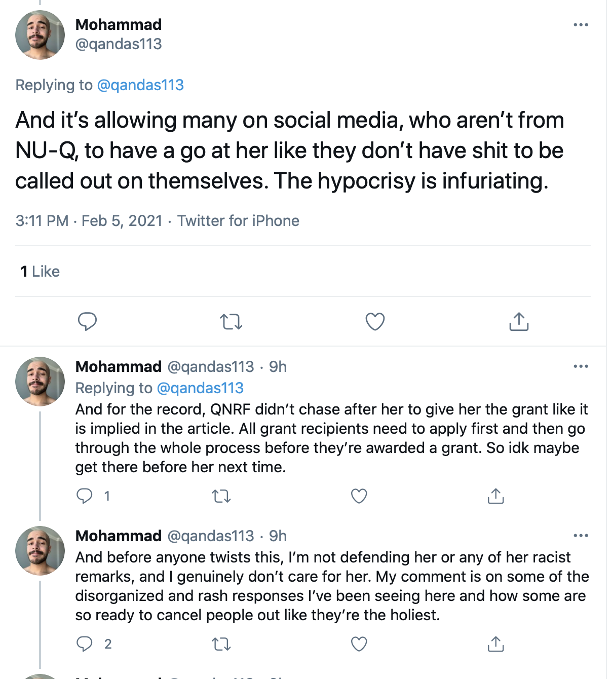
“What Jocelyn Mitchell said and wrote was completely horrible and in no way is it justifiable. I too was outraged when I heard the news in 2019. However, since then, she has apologized, and I do not believe that cancel culture allows anyone the room to grow and change. None of us can be held to the standards of our beliefs 12 years ago. If she has grown from it, then we should be open to letting her do so,” said Neha Rashid, NU-Q’s class of 2018.
Muhammad Sikandar Ali Chaudary, a journalism senior at NU-Q, emphasized that people can grow from their mistakes:
“Can we still hold people accountable for racism if they publicly apologize? Not to mention that she teaches a class [Inequality in America] on how to become anti-racist. For me, the only way one could hold her accountable is to assume that even after multiple public apologies, she could still be internally racist. Please note “assumptions” are the most illogical, redundant and discriminatory way to hold someone accountable. However, she has grown from her experience.”
Notwithstanding Mitchell’s apologies, some netizens have expressed disappointment and frustration on Twitter:


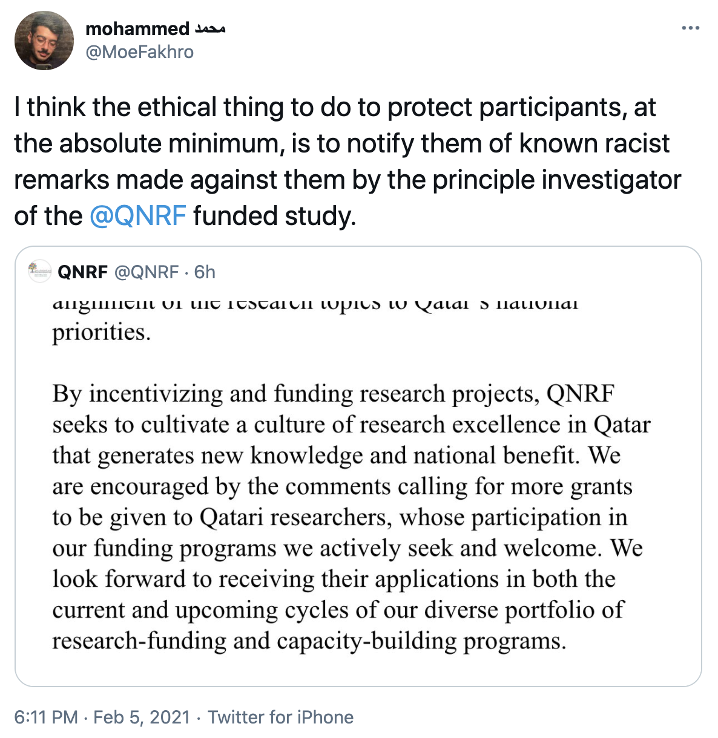
Some NU-Q students vouch for Mitchell and her daily work and beliefs.
“She has taught me so much about the history of the Gulf and has given me countless opportunities to develop myself, and I am truly grateful to have been her student,” said Kholoud Kafoud, a Qatari journalism sophomore at NU-Q and a research assistant of Mitchell.
Roja Pande, a journalism junior who took two classes with Mitchell and served as both a research assistant and a teaching assistant said, “Throughout my classes and my work experience, I’ve personally found a safe space to speak my mind and an encouraging environment to learn. And for me, the foundation of my classes with her was built on community and collegiality.”
In response to the outcry, NU-Q also released a statement addressing the controversy, highlighting the university’s continued devotion to fair research and equality:
“We acknowledge that the pain is real and, as an institution, we pledge to renew our efforts to heal the wounds. We reaffirm that Northwestern University in Qatar, under the leadership of Dean Kraidy, is genuinely committed to world-class research and teaching in, about, and for our context: Qatar, the Arab world, and the Global South. Consistent with Northwestern University’s tradition of scholarly excellence, we are passionately devoted to creating an environment that is free of any form of discrimination against any individual or group–including our Qatari students–and ensuring that every member of this community is treated with dignity and respect, is included in conversations affecting them, and is trained, nurtured, and empowered to create knowledge about their own community and the world—regardless of nationality, race, ethnicity, or gender.”
Managing Editor, Nadege Bizimungu, is a teaching assistant for Mitchell.




